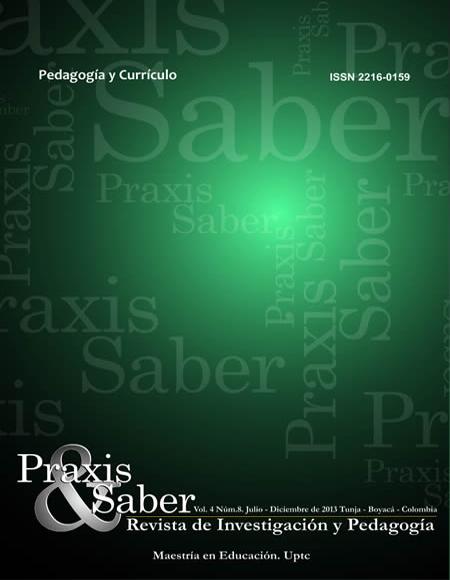Researching attitudes in school training abstract

Abstract
This work is a reflection article, product of the research referred to ‘Researching Attitudes of Young People in Research Training at the School’. The field of interest is focused on developing the contrast, of theoretical and critical type, facing the research training from the proposal of different research attitudes in the training processes of the school. Methodologically, it is constructed from the theoretical review of authors, exploring the problem at the same time. First the difficulties, expressed about the research training and the relationship of this type of education with traditional positivist view, are described. Within the text, it is proposed to visualize different attitudes in the scholar research training (childhood experience, self-knowledge, and the reflective and critical condition), based on the subjectivity of the classroom, placing the trainee as an object of reflection and action in his/her researcher process.Keywords
Attitude, research, training, school.
References
- BESLEY, T. & MARSHALL, J. (2005). 'Foucault and Disciplining the Self'. Educational Philosophy and Theory [37, 3, 309-315].
- https://doi.org/10.1111/j.1469-5812.2005.00121.x
- Bourdieu, P. (2001). El oficio del Científico: Ciencia de la ciencia y reflexividad. Barcelona: Editorial Anagrama.
- Bustamante, G. (1998). '¿Se puede formar en la investigación?' Revista Pedagogía y Saberes [11, 17-23]. Bogotá: Universidad Pedagógica Nacional.
- CUBILLOS, S. & cols. (2001). Educar para pensar, La actitud filosófica: un concepto de formación. Cali: Univalle.
- Deleuze, G. & Guattari, F. (1997). Mil Mesetas. Capitalismo y esquizofrenia. Valencia: Pre-Textos.
- Deleuze, G. & Parnet, C. (1987). Diálogos. Valencia: Pre-Textos.
- Díaz, B. F. & Rigo, M. A. (2000). 'Formación docente y educación basada en competencias'. Valle, M. A. [coord.]. Formación en competencias y certificación profesional. Pensamiento Universitario. Tercera época. México: CESU/UNAM.
- Flórez, R. (1998). Hacia una pedagogía del conocimiento. Bogotá: McGraw Hill.
- Florence, M. "Foucault, M." (1984). Dictionaire des Philosophes [297-298]. Paris.
- Foucault, M. (1981). Tecnologías del yo y otros textos afines. Barcelona: Editorial Paidós.
- Foucault, M.(1999). Estética, Ética y Hermenéutica. Obras esenciales. Vol. III. Barcelona: Paidós Ibérica.
- FOUCAULT, M. (2005). Vigilar y Castigar. Espa-a: Siglo XXI Editores.
- Freire, P. (1992). Pedagogía del Oprimido. México: Siglo XXI Editores.
- Gil, M. (2001). 'Filosofía y Actitud Pedagógica'. Cubillos, S. Educar para pensar, La actitud filosófica: un concepto de formación [87-97]. Cali: Univalle.
- Gimeno, J. & Pérez, A. (1992). Ense-anza para la comprensión. Comprender y transformar la ense-anza. Madrid: Morata.
- Giraldo, R. (2011). 'Modernidad y parrhesía. Michel Foucault y la cuestión de la resistencia como éthos'. Revista Estudios de Filosofía [137-147]. Antioquia: Universidad de Antioquia.
- Giroux, H. (2004). Teoría y resistencia en educación: Una pedagogía para la oposición. México:Siglo XXI Editores.
- Guba, E. & Lincoln I. (2000). 'Paradigmas en competencia en la investigación cualitativa'. Denman, C. A & Haro, J. A. [ed.]. Por los rincones. Antología de métodos cualitativos en investigación social [113-145]. Sonora: El Colegio de Sonora.
- Henao, L. (2001). 'Una nueva actitud para la educación del tercer milenio'. Cubillos, S. Educar para pensar, La actitud filosófica: un concepto de formación [39-65]. Cali: Univalle.
- Kant, E. (1980). Réflexions sur l’education. Paris: Vrin.
- KINCHELOE, L. (2005). 'On to the Next Level: Continuing the Conceptualization of the Bricolage'. Magazine Qualitative Inquiry [11, 3, 323-350]. Sage Publications.
- https://doi.org/10.1177/1077800405275056
- Kohan, W. (2009). Filosofía e Infancia. México D.F.: Progreso.
- Larrosa, J. (1995). 'Tecnologías del yo y educación. Notas sobre la construcción y la mediación de la experiencia de sí'. Larrosa, J. [Ed.]. Escuela, poder y subjetivación [259-232]. Madrid: La Piqueta.
- LARROSA, J. (2003). La experiencia y sus lenguajes. [Conferencia]. Recuperado en septiembre de 2011 de www.me.gov.co.ar/curriform/publica/oei_20031128/ponencia_larrosa.pdf
- Liebel, M. (2007). 'Jóvenes investigadores'. Revista Encuentro [78, 6-18]. Argentina: Pontificia Universidad Católica de Argentina.
- Lipman, M. (1998). Pensamiento Complejo y Educación. Madrid: Ediciones de la Torre.
- Meirieu, P. (1998). Frankenstein Educador. Barcelona: Editorial Laertes S.A.
- Melich, C. (2002). Filosofía de la Finitud. Barcelona: Editorial Herder.
- MESSINA, G. (2011). 'Investigación y Experiencia'. Revista Praxis & Saber [4, 61-75]. Tunja: Universidad Pedagógica y Tecnológica de Colombia, Maestría en Educación.
- MORENO, M. (2005). 'Potenciar la educación. Un currículum transversal de formación para la investigación'. Revista Electrónica Iberoamericana sobre Calidad, Eficacia y Cambio en Educación (REICE) [3, 1]. Recuperado de http://redalyc.uaemex.mx/pdf/551/55130152.pdf
- Pineda, D. (2004). Filosofía para jóvenes, el ABC. Bogotá. Editora Beta.
- Pineda, D. (2008). La construcción del oficio investigador: Una perspectiva Sherlokiana. Bogotá: Meditaciones Sherlokianas.
- Quiceno, C. (1988). Corrientes pedagógicas en el siglo XX en Colombia. Bogotá: Universidad del Valle.
- Rancière, J. (2007). El maestro ignorante. Cinco lecciones para la emancipación intelectual. Buenos Aires: Libros del Zorzal.
- RODRÍGUEz, A. (1976). Psicología social. México: Trillas.
- Schmid, W. (2002). En busca de un nuevo arte de vivir. La pregunta por el fundamento y la nueva fundamentación de la ética en Foucault. Cano, G. [Trad.]. Barcelona: Pre-Textos.
- Secord, P. & Backman, C. (1964). Social Psychology. New York: McGraw-Hill.
- VALERA, G. (2001). 'Escuela, alteridad y experiencia de sí: La producción pedagógica del sujeto'. Revista Educere [5, 13, 25-29]. Mérida: Universidad de los Andes.
Downloads
Download data is not yet available.